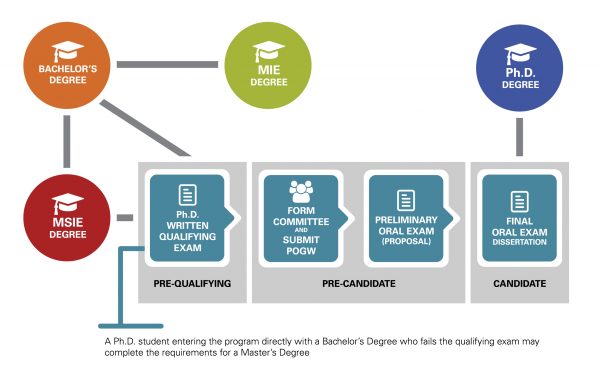Doctor of Philosophy in Industrial Engineering (Ph.D.) | NC State ISE

Doctor of Philosophy in Industrial Engineering (Ph.D.)
Last Updated: 10/29/2024 | All information is accurate and still up-to-date
The Ph.D. program is for outstanding students like you who are highly interested in independent study and research. It includes:
- Coursework across the field of industrial engineering
- Coursework outside your main discipline
- Advanced courses that support your research interests
You will also complete:
- A written qualifying exam
- A written and oral comprehensive preliminary exam
- Extended, in-depth research
- A written dissertation
- A final oral defense of your research
ISE PRO TIP: Ph.D. students are given priority for assistantship awards.
Matriculation into the Ph.D. Program

If you are an MS student who wants to continue to your Ph.D., contact the Director of Graduate Programs. Request a review of your file for admission. Usually, you should make this request in your final semester of your master’s degree. Letters from faculty members are essential for the decision process, so provide them when you ask for a departmental review.
You can also apply for the Direct Path from BS to Ph.D. This option allows you to skip the Master’s degree. In this case, you can choose to complete an en-route MIE degree.
- You must take and pass (B or better) one course from each of the four concentration areas: Human Factors and Ergonomics, Manufacturing Systems, Supply Chain and Logistics and Systems Analytics and Optimization. If you have a previous ISE degree from NC State or another institution, the Director of Graduate Programs may waive this requirement.
- You must take 12 credit hours of coursework outside of ISE. These courses should be technical in nature and approved by your advisor.
- You must pass the Ph.D. qualifying exam, which is offered once each year in August. You have two attempts to pass this exam. If you fail a second time, you will be terminated from the Ph.D. program.
- You must meet these first three requirements before scheduling the Preliminary Oral Examination.
- The degree requires a minimum of 74 graduate credit hours.
- You need at least 18 hours of letter-grade courses beyond the MS. Up to six of these can be non-ISE courses.
- You must take a minimum of two 700-level courses.
- You are required to take two semesters of ISE 801, earning one credit for each offering.
- Course requirements are checked using the Graduate Degree Audit in MyPack Portal. See the Degree Audit page for more information.
- You are encouraged to include “readings” and project courses (ISE 837 and ISE 839) for credit in your plans. These will help prepare you for the required written examinations and the dissertation proposal.
- At least six hours of graduate credit must include doctoral-level research and/or dissertation research (ISE 893 and ISE 895).
- There is no minor requirement; however, you may choose to pursue a minor. Check with the department offering the minor for specific course requirements.
- Minors from other departments with official requirements will appear on your transcript.
- Interested in a minor in statistics? Refer to the Guidelines for Minors in Statistics.
Research Advisory Committee
You must form a Research Advisory Committee of at least four faculty members with Graduate Faculty Status. Three members must be ISE faculty, and at least one must be affiliated with a department outside of ISE. An ISE faculty member will serve as the Chair of your committee, but you can also have a co-chair who doesn’t need to be from ISE.
Your committee can include additional members from outside the university, but speak to the Director of Graduate Programs if you need clarification. Every committee has a Graduate School Representative who isn’t a voting member but protects your interests as well as those of the advisory committee and the Graduate School. This graduate school representative is an “unbiased person” to whom the dean can consult for guidance and decisions.
Exam Structure
Prequalifying Phase
Prior to passing the Qualifying Exam:
- Although not required yet, it’s a good idea to select a faculty member as your research advisor. Enter this choice through the “Committee” link in the Graduate Degree Planner.
- Check that your Degree Audit correctly lists your courses and requirements.
Precandidacy Phase
After passing the Qualifying Exam and before the Preliminary Oral Exam:
- Set up your Ph.D. advisory committee using the “Committee” link in the Graduate Degree Planner.
- Write your dissertation proposal. While this document isn’t archival, it’s recommended that you use the required Graduate School format. Microsoft Word and LaTeX templates are available from the Graduate School.
- Following ISE Department custom, give your committee a copy of your proposal at least two weeks before the oral exam.
- Check the “Notification of the Graduate School” section below for steps to schedule your proposal exam.
Candidacy Phase
After passing the Preliminary Oral Exam
- Finish your dissertation.
- Ensure your document follows the required Graduate School format.
- As per ISE Department custom, provide your committee with a copy of your dissertation at least two weeks before the oral exam.
- Present and defend your dissertation.
- Submit your dissertation in the ETD format, with an initial draft due within 24 hours after your oral exam.
- ETD Deadlines
- ISE PRO TIP: It’s highly recommended that you submit papers related to your research to a professional, peer-reviewed journal.
Notification of Graduate School
- Complete the Request for Approval Form and send it to the Graduate Services Coordinator to schedule your Preliminary and Final Oral Exams.
- Schedule your exam when all committee members, including the Graduate School Representative, can attend.
- Graduate School policy requires all members to be present at the exam’s start.
- Confirm the exam schedule with each faculty member the day before.
Got Questions? Please contact our Graduate Services Coordinator | ise-gradoffice@ncsu.edu | 919.515.6410.
